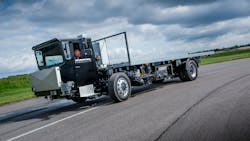Volta Trucks reveals fully electric prototype
Volta Trucks has begun engineering evaluation and development testing of the first prototype Volta Zero at Horiba Mira in Nuneaton, United Kingdom. The start of testing follows soon after the reveal of the first prototype chassis of the Volta Zero—the full-electric 16-tonne commercial vehicle designed specifically for inner city logistics.
Dubbed the Volta Minus One by development engineers, as the forerunner to the production-specification Volta Zero, the prototype vehicle uses the proposed production specification chassis frame and drivetrain of the finished vehicle and will test all the electro-mechanical and thermal properties of the truck. This includes the high-voltage battery supplied by Proterra, and the compact rear axle, electric motor and transmission eAxle unit from Meritor. The unconventional bodywork of the prototype is purely designed to protect the development driver from the elements when the vehicle is moving at speed. The production vehicle will feature a cargo box design, but the prototype uses a flatbed to allow engineers to add different levels and locations of loads to test its weight-carrying capacity.
“The start of testing and evaluation of the first prototype Volta Zero is a major milestone on our journey towards production, and an exciting time for all of the Volta Trucks team and our customers,” Ian Collins, chief product officer of Volta Trucks, said.
The prototype Volta Zero will continue testing at Horiba Mira over the coming months. The forthcoming test and development program with this and later-specification prototypes also includes periods of cold weather testing north of the Arctic Circle, and hot weather testing in southern Europe.
The data collected will be taken into the production of pilot fleet vehicles that will be tested and evaluated by customers who have signed up for both testing and the option to purchase series production trucks. This is designed to develop their understanding of how the Volta Zero will integrate into their operations. Full-scale production of customer-specification vehicles will then follow at the end of 2022.
"We work at a high pace to ensure that we can bring zero emission, full-electric commercial vehicles to market quickly, because our customers require vehicles as soon as possible," Collins added. "We need to go through a comprehensive and thorough development program, but the start of prototype testing is evidence that we are on track to deliver production vehicles, on time, by the end of next year.”
